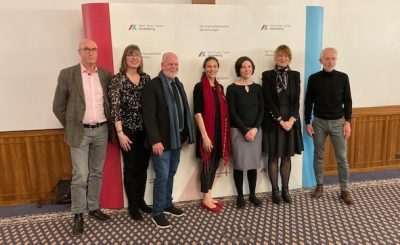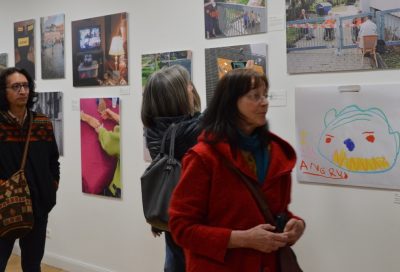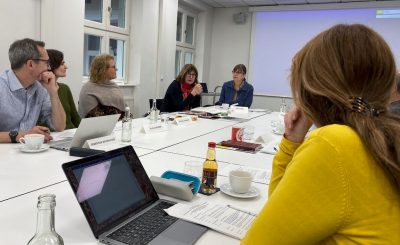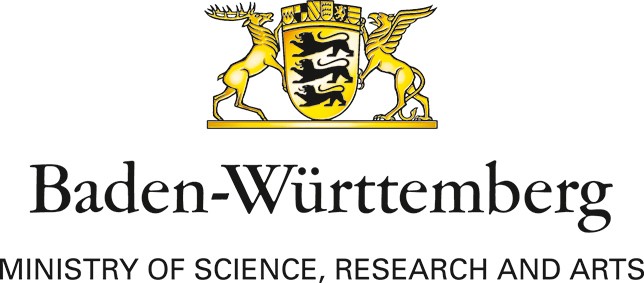Workshop of the Human Rights Education and Solidarity Working Group
The Heidelberg Workshop on New Approaches to Human Rights Dialogue and Public Engagement
Connecticut/Baden-Württemberg Human Rights Research Consortium
Mark Twain Center for Transatlantic Relations
April 26 – April 29, 2023
Wednesday, April 26, 2023
19:00
Dinner at Restaurant Krokodil, Kleinschmidtstrasse 12, Heidelberg
Thursday, April 27, 2023
14:00 – 16:00
Guided tour of the permanent exhibit of Mark Twain Center for Transatlantic Relations, Römerstrasse 162, 69126 Heidelberg.
17:30
Dinner at Restaurant Giardino, Karlsruher Straße 166, 69126 Heidelberg.
19:30
Opening and Exhibit at the Mark Twain Center for Transatlantic Relations, Römerstrasse 162, 69126 Heidelberg
Link to the Heidelberg Launch Page of Picturing the Pandemic
Friday, April 28, 2023
9:00
Meet & Greet/Introductions
9:30 – 10:30
Uwe Wenzel, Sarah Willen, Kate Mason, Alexis Boylan, “Picturing the Pandemic: Nurturing Dialogue and Instigating Transformative Change in Community Settings” (for background on the Heidelberg Exhibit and larger project see: https://picturingthepandemic.org/ and https://picturingthepandemic.org/deutsch)
11:00 - 12:00
Manuela Wagner and Alice Gruber, “Fostering Intercultural Citizenship through International Student Collaboration in VR”
12:15 -13:15
César Abadía-Barrero and Camilo Ruiz, “Casa Común: The Collective Building of an Archive of Pain and Healing with Victims of the Colombian Armed Conflict”
13:15 – 14:45
Lunch at the Mark Twain Center, discussion of direction of the group
14:45 – 15:45
Evein Obulor, Coordinator of the European Coalition of Cities Against Racism, to present on anti-discrimination work at the municipal level
16:00 – 17:00
Karin Amos and Natalie Reinhardt, “Solidarity and Education in the Context of Sinti/Roma Association and University Relations, the Example of the Sinti Powerclub”
19:00
Dinner at Tati Restaurant, Bergheimer Str. 147, 69115 Heidelberg
Saturday, April 29, 2023
11:00
Visit to the Documentation Centre of German Sinti and Roma, Bremeneckgasse 2, 69117 Heidelberg
Participants:
César Abadía-Barrero (University of Connecticut)
Karin Amos (University of Tübingen)
Kimberly Ballaro (Voices of Hope)
Alexis Boylan (University of Connecticut)
Davis Chacon-Hurtado (University of Connecticut)
Ercüment Çelik (University of Freiburg)
Manisha Desai (University of Connecticut)
Martina Diesing (Baden-Württemberg Ministry of Science, Research, and the Arts)
Alice Gruber (Augsburg University of Applied Sciences)
Kathy Libal (University of Connecticut)
Katherine Mason (Brown University)
Evein Obulor (Coordinator of the European Coalition of Cities Against Racism)
Natalie Reinhardt (Chair of Sinti Powerclub)
Lisa Werkmeister Rozas (University of Connecticut)
Camilo Ruiz (University of Connecticut)
Manuela Wagner (University of Connecticut)
Uwe Wenzel (Mark Twain Center for Transatlantic Relations)
Sarah Willen (University of Connecticut)
Sebastian Wogenstein (University of Connecticut)



Bio Sketches for the Heidelberg Workshop
César E. Abadía-Barrero is Associate Professor of Anthropology and Human Rights at the University of Connecticut. He is a medical anthropologist whose research integrates different critical perspectives in the study of how for-profit interests transform access, continuity, and quality of health care. He has conducted activist-oriented research in Brazil and Colombia, focusing on health care policies and programs, human rights judicialization and advocacy, and social movements in health. Abadía-Barrero is the author of I Have AIDS but I am Happy: Children’s Subjectivities, AIDS, and Social Responses in Brazil (2011, English and Portuguese editions) and Health in Ruins: The Capitalist Destruction of Medical Care (2022, English and Spanish editions). His current collaborative research follows decolonial proposals in health and wellbeing after Colombia’s 2016 peace accord. Together with Sarah Willen, Abadía-Barrero co-directs the Global Health and Human Rights research cluster at UConn’s Gladstein Family Human Rights Institute.
Karin Amos is Vice-Rector for Academic Affairs and Professor of Education at the University of Tuebingen. She graduated from the Goethe-University in Frankfurt/Main in 1986 with a first state exam in History and American Studies, served as a teaching assistant at Mills College from 1986 to 1988, took her PH.D in American Studies and her habilitation in Education in 2002. She is a member of the Tuebingen faculty since 2006 and served as Equal Opportunity officer before she joined the rectorate in 2013. Her research focuses on the societal contexts of education, on processes of inclusion and exclusion and how these are attached to categories such as gender, social class, race/ethnicity. Together with Prof. Kathryn Libal, Director of the Gladstein Family Human Rights Institute of the University of Connecticut, she is co-chair of the Working Group on Human Rights Education and Solidarity of the Connecticut/Baden-Württemberg Research Consortium. She is also a member of the steering committee of Scora Meet: https://scora-bw.de/scora-meet/.
Kimberly Ballaro is originally from Connecticut and holds a BA in History from Western CT State University. She holds an MA in Irish Studies from the University of Galway, Ireland, and now lives in Schwetzingen, Germany. She has just begun her PhD in Holocaust and Genocide Studies through Gratz College. Kimberly is the Director of the Holocaust Education Resource and Outreach (HERO) Center, a program under Voices of Hope, a Holocaust and genocide education non-profit organization. She has served as an Educator Fellow to Lithuania and Poland through the Jewish Hartford - European Roots project, is a member of the Community for Holocaust Education Centers (CHEC) through the United States Holocaust Memorial Museum, and, most, recently participated in the Echoes and Reflections Advanced Learning Seminar at Yad Vashem.
Alexis L. Boylan is a professor with a joint appointment in the Art and Art History Department and the Africana Studies Institute at the University of Connecticut. She is the author and editor of several books including Visual Culture (MIT Press, 2020) and Ellen Emmet Rand: Gender, Art, and Business (Bloomsbury Academic, 2020). Her next book project focuses on the visual culture for the American Museum of Natural History, NYC and how art and science antagonize and inspire cultural dialogues about truth, knowledge, race, and authority.
Davis Chacon-Hurtado is Assistant Research Professor of Civil and Environmental Engineering and Human Rights at the University of Connecticut. He co-directs the Engineering for Human Rights Initiative, which is a collaboration between the UConn’s Office of the Vice Provost for Research, the School of Engineering, and the Gladstein Family Human Rights Institute, promoting and advancing interdisciplinary research in engineering with a clear focus on societal outcomes. Chacon-Hurtado is working with a number of faculty on campus to develop research and curriculum at the intersection of human rights and engineering. He completed his Ph.D. in transportation and infrastructure systems at Purdue University. Chacon-Hurtado’s research interests include transportation equity, environmental justice, human rights, and economic resilience. He grew up in Cusco, Peru, where he obtained his BS in civil engineering at the University of San Antonio Abad of Cusco. Chacon-Hurtado also earned an MSCE degree from the University of Puerto Rico at Mayagüez.
Ercüment Çelik is a sociologist, whose research interests focus on the sociology of labour, Southern Sociology, global knowledge production and circulation, public sociology, anti-racism and academic freedom. He is senior lecturer in the Department of Sociology and research coordinator in the Department of Oriental Studies at the University of Freiburg, Germany. He was a Philipp Schwartz Initiative fellow of the Alexander von Humboldt Foundation at the Freiburg Institute for Advanced Studies (FRIAS) from 2019 to 2022. He is currently writing and editing a book with his students on the biographies of the German-Jewish Scholars in Turkish Exile, 1933-1945; and drafting a journal article together with two colleagues in the HRRC Working Group on academic freedom and academic solidarity. His ongoing teaching activity aims to bring to light the historical sources of anti-racism by focusing on the Universal Races Congress, London, 1911.
Manisha Desai is a Professor of Sociology and Asian and Asian American Studies at the University of Connecticut and a Senior Research Fellow at the United Nations Research Institute for Social Development (UNRISD) in Geneva, Switzerland. Her areas of research and teaching include gender and globalization, transnational feminisms and women’s human rights, and contemporary Indian society. Her current research examines women’s rights, land rights, and climate justice in India and NE United States. As a member of UNRISD’s Global Network for Research and Action's Strategy Committee she is also working on a Global Policy Seminar to be held in Bonn in August on a New Eco-Social Contract for addressing social and ecological injustices. She is on the Steering Committee of the Federation of Feminist Journal Editors that is seeking to establish a feminist, knowledge commons outside commercial publishing. Her most recent book is Subaltern Movements in India: The Gendered Geography of Struggles Against Neoliberal Development (Routledge 2016). Desai is the recipient of, among others: UConn CLAS' 2023 Academic Leadership award; the Sociologist for Women in Society’s 2015 Distinguished Feminist Award, a career award for contribution to feminist scholarship; and the 2016 Faculty Mentor Award from the Compact for Faculty Diversity in the United States. She has served in many leadership capacities including as President of Sociologist for Women in Society.
Martina Diesing is program officer at the Unit for Internationalization at the Ministry of Science, Research and Arts in the State of Baden-Württemberg. She has been working at that since December 2011. She started at the Ministry’s Unit for Equality and Promotion of Women in February 2009. At the Unit for Internationalization, she is responsible for relations with North America. The partnership with Connecticut and the state-wide programs with various higher education systems in the US and Canada are important parts of her work.
Alice Gruber, PhD (University of Reading, UK), is Professor of Business English at Augsburg Technical University of Applied Sciences, Germany. She is a fully qualified language teacher with twenty years of teaching experience at the secondary and tertiary levels. She has taught foreign languages and linguistics in the UK and Germany. Alice conducts research on additional language learning pedagogies and technology-enhanced language education, focusing on virtual reality and augmented reality for language learning. Her research interests include Global Englishes, curriculum development and intercultural communication. Alice has been involved in projects creating Open Educational Resources for practitioners and learners on a range of topics including intercultural communication, artificial intelligence and ethical issues, and teacher training materials for Global Englishes language teaching.
Kathryn Libal is the Director of the Gladstein Family Human Rights Institute, Interim Director of Dodd Human Rights Impact, and Associate Professor of Social Work and Human Rights at the University of Connecticut. Libal co-edited, with Shareen Hertel, Human Rights in the United States: Beyond Exceptionalism (2011) and authored, with Scott Harding, Human Rights-Based Approaches to Community Practice in the United States (2015). She also co-edited, with S. Megan Berthold, Refugees and Asylum Seekers: Interdisciplinary and Comparative Perspectives (2019) and most recently co-edited, with Molly Land and Jillian Chambers, Beyond Borders: The Human Rights of Noncitizens at Home and Abroad (2021). Libal serves on the editorial board of the Journal of Human Rights and Social Work and serves on the Steering Committee of Scholars at Risk USA Chapter. She co-chairs, with Karin Amos Vice-Rector for Academic Affairs and Professor of Education at the University of Tübingen, the Working Group on Human Rights Education and Solidarity of the Connecticut/Baden-Württemberg Research Consortium. Libal received her MA and Ph.D. in anthropology from the University of Washington.
Katherine A. Mason is Associate Professor of Anthropology at Brown University and Co-Founder of the Pandemic Journaling Project. She is a medical anthropologist whose research addresses issues in population health, bioethics, China studies, reproductive health, mental health, and global health. Her first book, Infectious Change: Reinventing Chinese Public Health after an Epidemic, based on fieldwork she conducted in southeastern China on the transformation of public health in China following the 2003 SARS epidemic (Stanford University Press, 2016). Infectious Change won the Foundation for the Sociology of Health and Illness Book Prize in 2019. Her scholarly work has appeared in American Ethnologist, American Anthropologist, Medical Anthropology Quarterly, The China Journal, International Journal of Feminist Approaches to Bioethics, and the Journal of Infectious Diseases, among many other venues. Dr. Mason is also currently working on a book project on perinatal mood and anxiety disorders (PMADs), based on several years of multi-sited ethnographic fieldwork that she conducted in the U.S. and China between 2015 and 2021. She is a certified postpartum doula (DONA International) and holds a certificate in maternal mental health from Postpartum Support International. She earned her PhD in social anthropology from Harvard University in 2011.
Evein Obulor is working on different levels of our societies to fight racism. In her current position as the Coordinator of the European Coalition of Cities Against Racism she works on racial injustices at the city level. She facilitates the exchange of antiracist policies for more than 150 European cities and supports them in shaping a European platform that promotes the role of cities in building inclusive and antiracist societies. As the Founder of the Migration Hub Heidelberg, a network for initiatives and actors working in the fields of antiracism and migration, she supports grassroots organizations, especially BIPOC-led groups, in making their engagement more sustainable and visible. With an academic background in Political Science and Education (University of Heidelberg) as well as Peace & Conflict Transformation (UNESCO Chair for Peace Studies, Innsbruck University), Evein works as a trainer and consultant for projects related to antiracism, youth empowerment and women’s rights. As a facilitator of the Youth Think Tank, a platform for meaningful youth participation, she empowers young people to actively shape society. She is a passionate Black feminist who served as a Youth Observer for the UN Commission on the Status of Women and has a weakness for chocolate and movie nights.
Natalie Reinhardt, Chair of Sinti Powerclub, organizes children’s and youth work with young Sinti for many years. She has studied at the PH Weingarten and is chairing the registered Association. She is liaison for the Administrative Units (Regierungspräsidien) Stuttgart und Tübingen.
Lisa Werkmeister Rozas is a first generation Peruvian-American and Professor at the University of Connecticut School of Social Work. She began her career as a clinical social worker at a community-based agency with Latin@ individuals and families. After receiving her Ph.D. in social work, she completed a postdoctoral fellowship at Yale University School of Medicine, Department of Psychiatry before joining the UConn in 2004. She has served as the director of the BSW program and the Puerto Rican/Latin@ Studies Project at the UConn School of Social Work. Her research and teaching interests focus on the examination of coloniality, White Supremacy, implicit bias and their effects on intersectional identities and the importance of critical consciousness on advocacy and allyship. Her interests also include centering indigenous knowledge within higher education and the environmental justice movement. She is the co-author of the 3rd edition of Racism in the United States: Implications for the Helping Professions (2021).
Camilo Ruiz is Assistant Professor in Anthropology at the University of Connecticut. Ruiz has more than fifteen years of experience in ethnographic and anthropological work in Colombia and the United States. Utilizing the combined strengths of community-based participatory research (CBPR), anthropology, public health, and the arts, Ruiz’s work aims to better understand health inequities in urban and rural communities. Currently, Ruiz is building a CBPR inter-institutional laboratory in Hartford that will invite local communities to conduct critical and applied research. For Casa Común, Ruiz worked closely with the community artists, victims of the Colombian armed conflict to conceptualize and create the art piece that was recently exhibited at the Gladstein Family Human Rights Institute for its 20th anniversary.
Manuela Wagner, professor of Literatures, Cultures, and Languages at the University of Connecticut, specializes in the integration of intercultural dialogue and citizenship in education with the goal of fostering an environment in which students can sustain different parts of their identities . She is particularly interested in the interplay of theory and practice and enjoys collaborating with colleagues in K-20. Examples of projects can be found in her co-authored and co-edited volumes: Teaching Intercultural Citizenship Across the Curriculum: The Role of Language Education (2019) Teaching Intercultural Competence Across the Age Range: From Theory to Practice (2018), Education for Intercultural Citizenship: Principles in Practice (2017). Together with Anke Finger, she edited the volume Bias, Belief, and Conviction in an Age of Fake Facts (2022). Other research interests include intellectual humility and conviction, humor in a variety of contexts (language education, German-speaking cultures), dual language learning, and first language acquisition (pragmatic development in infants and children and language development in children with Autism Spectrum Disorder).
Uwe Wenzel is the Director of the Mark Twain Center for Transatlantic Relations (MTC). Dr. Wenzel gained his PhD from the University of Frankfurt/Main with a thesis on interest group coalitions in the USA, and has taught on political science and American studies programs at Chemnitz University and the University of Freiburg. His published academic work covers topics including political representation of ethnic minorities, racism and ethnicity, and migration policy. Between 2001 and 2008 Dr. Wenzel worked as a lobbyist for the Central Council of German Sinti and Roma, the largest organization for this minority in Germany, representing their interests to international human rights organizations. Following this he organized educational programs for young people for the State of Baden-Württemberg. From 2015, he developed and delivered projects for a number of Federal and State ministries to support migrants in obtaining vocational and academic qualifications. In addition to his work as Director of the MTC he lectures in political science at Heidelberg University and the University of Kaiserslautern.
Sarah S. Willen is Associate Professor of Anthropology at the University of Connecticut, where she also co-directs the Research Program on Global Health & Human Rights at the Human Rights Institute. A medical and sociocultural anthropologist, she has published widely on issues of precarious migration, migration and health, health equity, health and human rights, and medical education, among other topics, including her multiple award-winning book, Fighting for Dignity: Migrant Lives at Israel’s Margins (University of Pennsylvania Press, 2019). She is Principal Investigator of the RWJF-funded ARCHES | the AmeRicans’ Conceptions of Health Equity Study, Co-Founder of the Pandemic Journaling Project, and Co-Curator of the Picturing the Pandemic exhibition.
Sebastian Wogenstein is Associate Professor of German and Comparative Literature at the University of Connecticut, co-director of the Connecticut/Baden-Württemberg Human Rights Research Consortium (HRRC), and a faculty associate of the Gladstein Family Human Rights Institute and the Center for Judaic Studies and Contemporary Jewish Life. Wogenstein’s research focuses primarily on German Jewish literature, theater, and the intersection of literature and human rights. He is the author of Horizonte der Moderne: Tragödie und Judentum von Cohen bis Levinas (Horizons of Modernity: Tragedy and Judaism from Cohen to Levinas) and co-editor of two books, Globale Kulturen–Kulturen der Globalisierung (Global Cultures–Cultures of Globalization) and An Grenzen: Literarische Erkundungen (On Borders: Literary Explorations).


